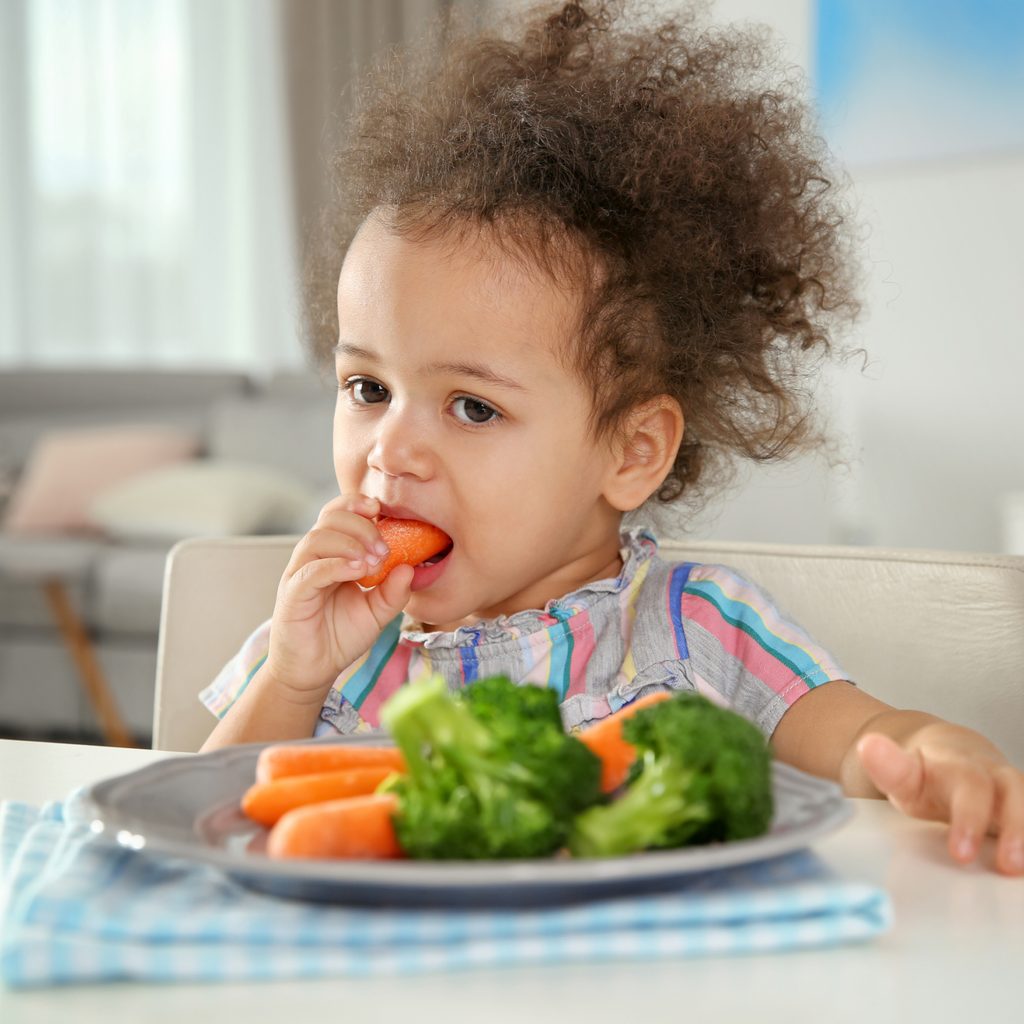It’s entirely possible to raise a baby with a vegan diet as long as you make sure they are getting all of the important nutrients they need to grow, just as you would with any balanced diet plan. Once you are past the first months of exclusive, necessary milk (either breastmilk or formula), choosing their foods will simply take a little bit of extra planning.
If you’re raising your child as a vegan for personal beliefs and you are also vegan, feed your baby what you eat, just like non-vegan parents are recommended to do. If you’re following this diet for your child because of their allergies or other physical restrictions, you can eat what they eat or you can cook separately. Either way, your child’s health comes first, and if they are deficient in any nutrient as they grow, it can be a serious health concern. Make sure they are getting what they need, even if it comes from supplements instead of foods. It’s best for nutrients to come from foods, but more important that they get them at all. Multivitamins aren’t recommended for kids until they are 4 or 5 years old, though some are okay for ages 2 and up. Always consult with a pediatrician before giving your child a multivitamin or supplement.

Raising a vegan baby
Easily enough, babies often start off eating fruits, vegetables, and grains, which are naturally vegan. While they are still having breastmilk or formula during the first year, they will be getting much of their nutrition from that source as they begin to play with solid foods. Getting enough of particular nutrients becomes more of a concern as they wean away from that milk.
What nutrients could vegan babies lack in their diet?
Eliminating meat, eggs, and dairy from a diet can lead to deficiencies in certain nutrients if those nutrients aren’t replaced with other foods. Take special care to make sure your baby’s diet includes enough of the following:
- Calcium
- Iron
- Protein
- Vitamin B12
- Vitamin D
Look for food products that are enhanced with these nutrients, like baby oatmeal with added vitamins. Fortified foods like cereals will help but consult with your pediatrician and potentially a nutritionist about if any supplements are needed or recommended. These can all also be found in naturally vegan foods.

What can vegan babies eat to replace these nutrients?
Vegan babies can eat what vegan adults eat, for the most part. While many vegan meat substitutes are soy-based products, opt for natural foods over highly-processed options when possible. Vegan chicken nuggets exist, but mashed peas can also deliver protein and other important parts of a balanced diet instead.
These plant-based foods naturally contain protein and other nutrients typically provided by meat and dairy:
- Beans
- Lentils
- Peas
- Soy
- Tofu
- Whole grains
Making a mash or puree of beans, lentils, peas, or tofu with vegetables added can make a good meal. Fortified foods like cereals or soy milk with added vitamins are also excellent options for a vegan or vegetarian baby diet.
The USDA recommends that a 1-year-old eating 700 calories a day divide it this way:
- 0.66 cup of vegetables
- 0.5 cup of fruits
- 1.75 ounces of grains
- 1.66 cup of dairy
- 2 ounces of protein foods
- 9 grams of oils
Since protein foods include beans, soy products, and other vegan foods, the only part to replace is dairy. If a vegan cheese or other dairy replacement is soy-based, remember it is a protein food, not a dairy food, no matter what words are used to market it. Since calcium is the main ingredient that needs to be replaced from not eating dairy, look at the calcium content of tofu, nuts, sweet potato, peas, broccoli, and beans. Again, fortified foods like waffles or hummus may have many nutrients like calcium added in.
What milk should vegan babies drink?
Fortified unsweetened full-fat soy milk can be part of a healthy diet for kids over a year old who can’t or don’t drink cow milk, according to the USDA Dietary Guidelines. While it cannot be a replacement for breastmilk or formula for babies under one year old, fortified soy milk is okay after one year. Make sure not to use a flavor like vanilla for added sugar but to get unsweetened only. Some other milk, like Ripple from pea protein, have even more calcium and protein than cow’s milk but consult with a pediatrician before giving your child daily non-dairy milk.
Raising a vegan baby has its challenges, but it can definitely be done. Always talk to your pediatrician, though, to ensure that your baby’s development is on track and that they aren’t missing any key nutrients by following a vegan or vegetarian diet.



